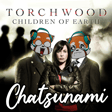
The Significance of Spec Ops: The Line
NOTE: This episode was recorded before the delisting incident. This episode also contains discussions of themes that some listeners may find upsetting. Listener discretion is advised.
In this first solo episode of Chatsunami, Satsunami discusses the significance of the game Spec Ops: The Line. How does it hold up against it's contemporaries in the shooter genre? Why is it still revered today? And can horror truly bloom on the Dubai battlefield? Strap in as we dive head first into the world of Spec Ops: The Line!
This podcast is a member of the PodPack Collective, an indie podcasting group dedicated to spreading positivity within the podcast community. For further information, please follow the link: https://linktr.ee/podpackcollective
Check out all of our content here: https://linktr.ee/chatsunami
Website: chatsunami.com
Twitter/X: https://twitter.com/ChatsunamiPod
Instagram: https://www.instagram.com/chatsunami/
TikTok: tiktok.com/@chatsunami
Patrons:
Battle Toaster
Sonia
Greenshield95
Danny Brown
Aaron Huggett
Use my special link zen.ai/chatsunami and use chatsunami to save 30% off your first three months of Zencastr professional. #madeonzencastr
Stay safe, stay awesome and most importantly, stay hydrated!















